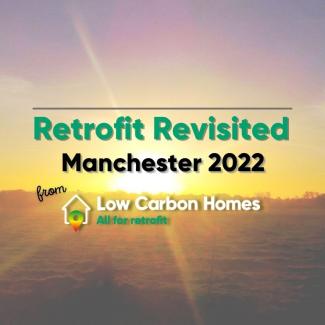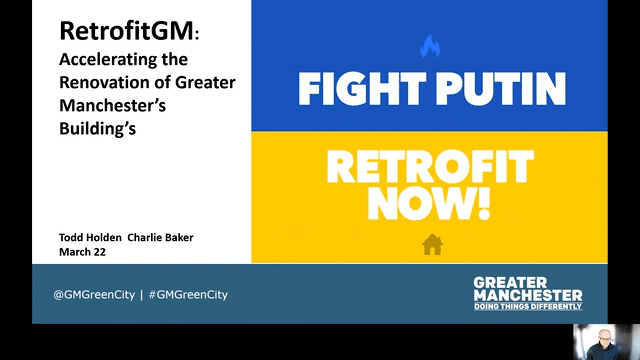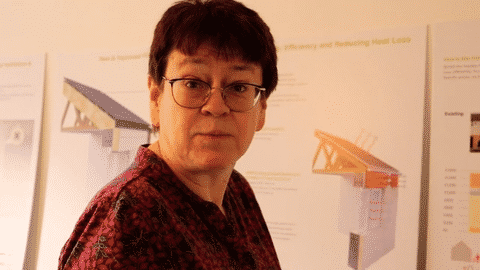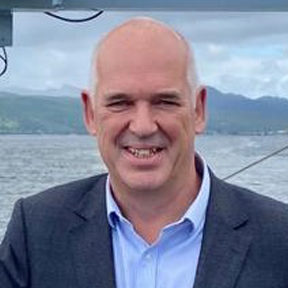Manchester retrofit revisited

We were delighted to have the Mayor of Greater Manchester, Andy Burnham, speak at our conference.

Mayor of Greater Manchester
“Here in Greater Manchester, we’ve always been committed to a fair and just transition,” he said.
“It has never been more important than it is today as we enter an energy crisis the likes of which we have never experienced. Our energy costs had already increased by around 70% even before the war in Ukraine and they will undoubtedly rise further, with an average bill of £3,000 being the norm by October.
It was great to see Andy’s colleagues at Manchester City Council echo these commitments to sustainability and affordability.
“We know that our houses and flats contribute around 30% of the city’s carbon emissions,” the Council’s executive member for environment councillor Tracey Rawlins informed attendees. “The thing about putting money back into people’s pockets is also really important with the cost-of-living crisis we’re experiencing.”
Andy then informed us what was being done regionally to get retrofit off the ground. “Last July I set up the Greater Manchester Retrofit Taskforce which in March published its action and implementation plan for the next three years.
“While the action plan is new, we’re not starting from scratch,” he pointed out. “We’re already spending £24m on retrofitting fuel poor homes. We’ve secured £97m to improve public buildings, and £19m to spend on social housing via the Social Housing Decarbonisation Fund.
“We’ve also contracted with a consortium headed by Retrofit Works and Red Co-op to provide owner-occupiers and private landlords with independent advice and support which clearly outlines how they should retrofit their home, the technologies which are appropriate and the costs involved, and if the homeowner wants to undertake the works.
Size of the prize
Todd Holden, energy policy and programme lead at the Greater Manchester Combined Authority (GMCA), provided more info on the service to which Andy alluded and why it had been geared to the willing-to-pay market.
“The work we’ve done with the ESC identifies that 30% of the GM population who fall into this space are able and willing to do something.”
Todd’s figures showed that there are 1.2 million properties in Greater Manchester, with 300,000 open to retrofit and a market value of between £3bn and 4.5bn based on £10,000 to £18,000’s worth of improvements per house.

and Charlie Baker (Red Co-operative)
Charlie Baker, lead designer at Red Co-op, told us what the service entailed. “It’s going to fabric first, aiming to get domestic energy demand to a point where we can supply it all from solar PV on the roof while keeping total outgoings for your warmth less than what they are now and above all giving customers the choice to go as far as they want.”
The service, Charlie explained, would cover interest and engagement; triage assessment; detailed assessment; retrofit design; costing; feasibility assessment; decision-making and finance; contractor instruction; retrofit works; updating digital twin; and post works monitoring.
He emphasised that the service was designed to minimise costs for householders. “We’re going to need those pioneers to do this for us but we think we can reduce those costs. We’re going to make sure that the assessment process is as good as we can manage but at a price point that you can afford. People will have access to Plan Builder and to an assessor to take them through it. There will be a short visit version and nearly full SAP approach, and a full house assessment for those who want it.”
‘Neighbours trust neighbours’
Jonathan Atkinson from new kid on the block People Powered Retrofit also stressed the importance of effective customer engagement throughout the retrofit lifecycle.

Carbon Co-op
“We need neighbourhood scale retrofit because it’s at this level that you see customers, contractors and finance. This underpins PPR’s approach, which targets specific areas within the conurbation like Levenshulme in south Manchester in our Area Based Retrofit Project.”
PPR’s approach was based on community-based social marketing, or endorsements by word of mouth between members of a community, Jonathan told us.
“This is more effective than ads on the back of buses. It’s a local, neighbourhood-scale approach to retrofit that uses early adopters and community champions to advocate for retrofit and to spread the message. They are the best people to do that; people are more likely to procure a retrofit work project if a friend or neighbour has recommended it to them.
Jenny Osborne from tenant engagement experts TPAS agreed on the importance of community-based advocacy particularly in the social housing space during one of our Q&A sessions.
“The reality is that neighbours trust neighbours, so that bank of case studies is absolutely another trusted source.”

TPAS and Placeshapers, a network of place-based housing organisations, had been working together over the previous 18 months on the issue of resident engagement in net zero, Jenny explained. “We felt that the voice of tenants was absent.”
“We really tried to explore why tenants would get on board with this. What did they think landlords needed to be saying to them for them?
“Case studies or endorsements from residents who have had this work done is absolutely key,” she reported. “I can’t stress that enough.”
We had some amazing insights into how other housing associations in Manchester were engaging tenants. Judy Noah and Vicky Young from One Manchester talked to us about the Grey Mare Lane, a £3 million regeneration project in east Manchester.
“Robust customer engagement material is key to winning the hearts and minds of residents,” Judy said. “This is about changing behaviour. We wanted to go with gas removal, for example, but we can’t force residents to remove gas. It’s their choice and one of the key concerns with residents was losing gas cookers.”

One Manchester
Judy and Vicky also shared with us some of the methods they’d used to engage residents. “We delivered detailed home information packs with personal visits to all residents, we held open evenings with our architects detailing the proposed works, we opened a community hub to ensure residents had the opportunity to understand the products on offer, we’re carrying out home visits on a regular basis and we have a dedicated tenant liaison officer.”
‘Wave 2 is coming’
We were delighted to welcome back Matt Harrison, Programme Director of the Government’s Social Housing Decarbonisation Fund, who updated us on the current state of play.
“Wave 2, which will total £800m, is coming and I’d encourage all of you to think very hard about your approach and strategy for engaging in that process.

Director, Social Housing Decarbonisation Fund
BEIS
“The key thing,” Matt elucidated, “is to think about how you make a bid for the money, how you match it with your own funding, and how you move into a much more substantial and sustained wave of funding for decarbonisation.”
There would be support for housing associations looking to put bids in, Matt assured attendees. “One thing we’re doing to help you consider making bids for Wave 2 is that we have put in place the Social Housing Retrofit Accelerator. This is a scheme that provides one-to-many and one-to-one support for Housing Associations and Local Authorities wishing to put a compelling bid together.”
As well as policy support, our conference found there were lots of technical solutions out there lending themselves to the social housing sector.
“Silk Street will see 69 low carbon social homes equipped with solar PV,” Councillor Rawlins told attendees. “The scheme will also be using ground source heat pumps and mechanical ventilation with heat recovery (MVHR) to keep utility costs down for residents.”
Iain Carr, speaking on behalf of the award-winning ground source heat pump company Kensa Contracting, also highlighted the possibility of ground source heat pumps enabling neighbourhood-level renewable energy schemes.

Kensa Contracting
“Can we support communities in their own aspirations towards creating their own energy schemes?” he was asked during a Q&A. “The simple answer is yes. In the first instance of any project we’d generate a fully costed feasibility study. We do this for free for all projects.
“The main community aspect of it runs into slightly different headaches in terms of credit limits and things like that for progressing further. But funding is certainly out there and available. We work with a couple of partners who deal specifically with community-driven stuff. We’re always there to have that conversation.”
Ian also highlighted Heat the Streets, a renewable heating project in Cornwall which Kensa Contracting was part funding to provide energy to several hundred homes. We’ve got many other systems as case studies,” Ian said. “You can go to our website, pick up the Knowledge Hub and look through the case studies there.”
Myth busting
Our Manchester conference proved useful for our thought leadership manufacturing partners to tackle common misconceptions around their products head on.
Paul Barlow from Stelrad Radiator Group was asked during a Q&A whether it was wise to install low temperature radiators under a windowsill.
“When we fit radiators in a room we’re trying to create the best thermal comfort for the inhabitant. You might think that to fit the radiator right underneath the window would be the worst place because you’ll maximise heat loss. What you’re actually doing is you’re putting the radiator where you’re losing the heat.
“You’ll create a better, more comfortable balance across the room,” Paul explained, “So maybe not what you think in terms of maximising the heat but better for thermal comfort.
Similarly, Simon Brown from Panasonic busted some myths around heat pumps. “There’s a sense within the industry that air source heat pumps are brand new — they’re not. Panasonic launched its first air-to-water heat pump in Japan in 1973. So the technology has been around for a long time and all of you have a heat pump in reverse, which is your fridge!
“Another question we often get asked is, are they noisy?” Simon continued. “The short answer is no. With a sound power of around 56dB, our Aquarea air to water heat pump range is no louder than me speaking to you now!”
Oliver Baker, Managing Director of Ambion Heating, explained to us how his company’s state-of-the-art computer-controlled infrared (CCIR) heating system and KERS renewable hot water system made the ideal alternative to traditional non-renewable heating systems.

CEO, Ambion Heating
“It’s as easy to install as a conventional panel heating system, versatile enough to suit different properties and typically comes with lower costs,” Oliver told attendees, “meaning social housing providers for instance can boost their stock’s energy performance on a budget while delivering affordable warmth.”
Getting better as we go forward
We were glad to see our thought leadership partners also share invaluable insights about the supply chain issues we’ve been seeing in the low temperature heating industry.
“We’ve seen some delays for components in our system,” Oliver said. “But we hold stock, so there's no short term risk to delivery. We have an advantage in that there’s not that much kit involved.
“The real blocker for us has been getting enough installers for heat pumps. Again, that’s slightly different for us because ours is a straightforward electric installation so we do some training for our install partners. So it’s fairly easy to mobilise installer resources at scale, perhaps easier than it is for specialist businesses putting in heat pumps.
Simon was very helpful for providing clarification on the issues surrounding the supply chain which many of our panellists agreed was a real obstacle to scaling up retrofit.
“Heat pump manufacturers, and even some boiler manufacturers now, are suffering from supply chain issues. I really want to highlight where it’s stemmed from. Obviously, the pandemic has had a major effect on just-in-time deliveries, and the war in Ukraine has caused further delays to shipping.
“But lots of companies in this space are global manufacturers, so some of the global supply chains within the heat pump industry are still being hit.
However, Simon was confident these supply chain issues would resolve themselves very soon. “We do feel that in the summer months continuity of supply should be better, and as this scales up and we install more we’ll be getting better at this as we go forward.”
‘A huge desire for carbon negative career pathways’
Our conference also focused on some of the skills shortages in Manchester’s supply chain.
Joe Crolla, skills lead at the GMCA, presented us with a sense of the skills picture in the conurbation.

“As a result of devolution, the GMCA has some powers on skills and work. To ensure we meet employers’ needs, we do a lot of work with companies and bodies to understand what their needs are. We cover retrofit, we cover the green economy and we cover the wider construction sector as well, so we’ve got a reasonable picture of what the skills picture looks like in GM.
“There’s a shortage of construction workers here,” Joe confirmed. “And one of the biggest challenges is how busy the workforce already is; there’s an awful lot of demand for construction work with order books full already.
We then got some crucial insights into why contractors were finding it hard to upskill and move into the retrofit space.
“One of the things that many employers have told us is that the qualifications structures aren’t agile or flexible enough to deal with this problem,” Joe informed us. “Retrofit will involve new, niche technology. The skills system hasn’t kept up with that. There’s a real need for more modular, flexible programmes.”
At the same time, today’s school leavers were highly aware of the problem of climate breakdown and wanted to do their bit to counter it, which was an opportunity, Joe pointed out. “There’s a huge desire among young people for carbon negative career pathways. They’re very conscious of climate change. Steering young people into these pathways is something we’d like to do more of.”
Tricia Allen, work and skills specialist at Manchester City Council, talked about some of the work the Council was doing to do just that.
Manchester City Council
“We’re working in schools to embed green skills into the curriculum and into careers advice. We’re providing labour market intelligence as well as advising schools on retrofitting their buildings and estate. We’re currently mapping training providers and developing labour market intel so we can identify what the current offer is and gaps within it.”
‘Springboard for recovery’
As well as upskilling, our conference heard about all of the financial support there was out there for small to medium size construction enterprises.
Marissa Looby, home energy lead at Local Energy North West Hub, painted a picture of the funding landscape to develop retrofit projects. “The North West is currently delivering on multiple programmes concurrently.” These included the Boiler Upgrade Scheme, Wave 2 of the SHDF and the Local Authority Delivery scheme (LAD).
During the Q&A, Marissa provided further details on how businesses could capitalise on funding and work emanating from funding and financing in the public sector.

Local Energy North West Hub
“As part of the LAD2 programme, the North West Hub set up a dynamic purchasing system through Procure Plus. It was specifically for retrofit projects in relation to PAS, with different pots from a turn-key solution where a contractor did everything, to installer lots, and retrofit assessment and coordinator roles.
“We set it up last year and it was piloted through the Liverpool Combined Authority LAD2 programme,” Marissa explained. “Subsequently, we’ve had four other pots of the LAD2 contract drawn from the Procure Plus purchasing system and we’re now seeing that starting to be used for sustainable warmth.
“So I’d say to any suppliers in the North West who want to get involved in this, there’s a large amount of contracts coming through that.
“And as local authorities are getting in-house staff there are different ways that these contracts are being thought through. In Cumbria they’re looking to build a local supply chain. They had a meet-the-buyer day with Procure Plus and walked through the different ways they’re going to split the contract between those lots through the coordination as well as the install.
“Also for those smaller contractors there who couldn’t bid for the larger pieces of work, I suggest building a local supply chain list to give to those main contractors who can then hopefully subcontract.”
Marcos Navarro, UK Sustainability Lead (Housing) at NatWest Group, also signposted attendees to support small to medium enterprises in the reconstruction space.

NatWest Group
“Our springboard for recovery report showed that there’s £160+ billion opp for SMEs to address the climate challenge.
“We’ve also committed £100bn towards sustainable finance by 2025. It’s worth noting that £20bn of that was spent between 2020 and 2022. However, we met that target in one year and therefore, given the direction of travel and the scale of the challenge, we increased that commitment to £100bn from now until 2025.”
Low Carbon Homes would like to thank all speakers, partners and attendees for making our third Manchester retrofit event such a successful and productive gathering of housing and retrofit professionals, and we look forward to seeing everyone back 'in Manchester' at future events.
We're Low Carbon Homes and we're #AllForRetrofit.
Sign up for a (free) Low Carbon Homes profile and access the video and slide resources from this and all our recent retrofit summits and conferences.

by Alex King -
Manchester-based journalist and low carbon activist